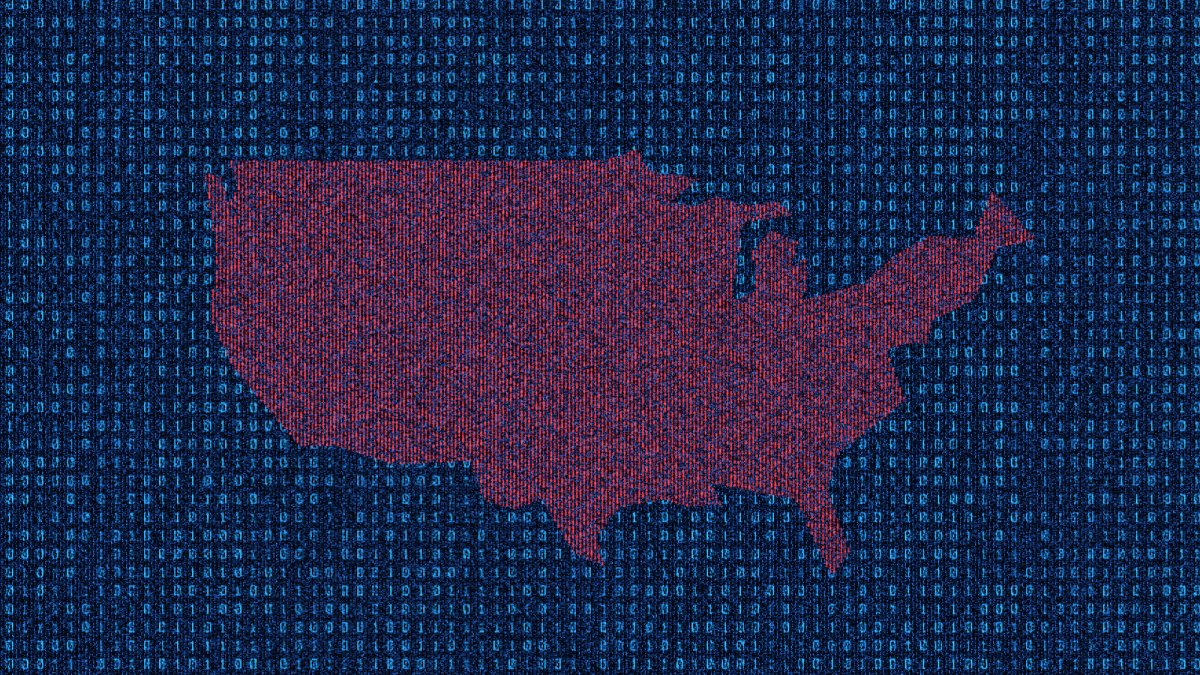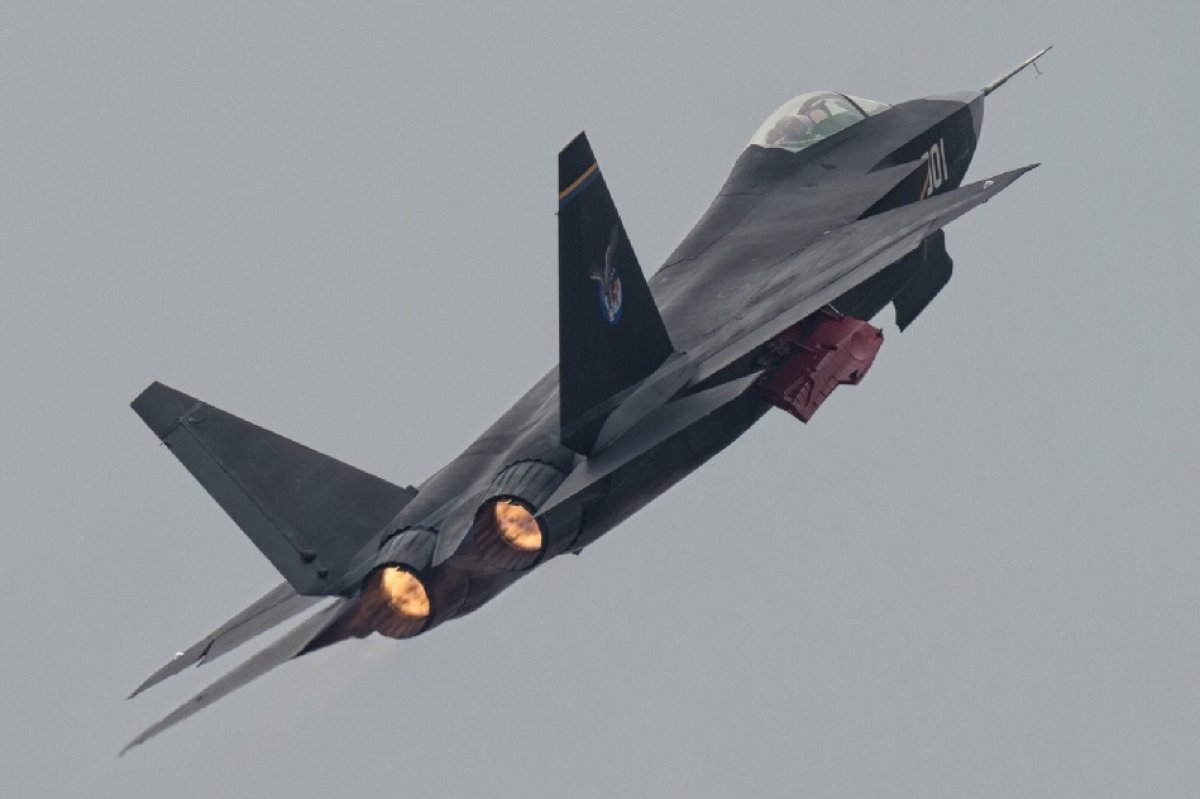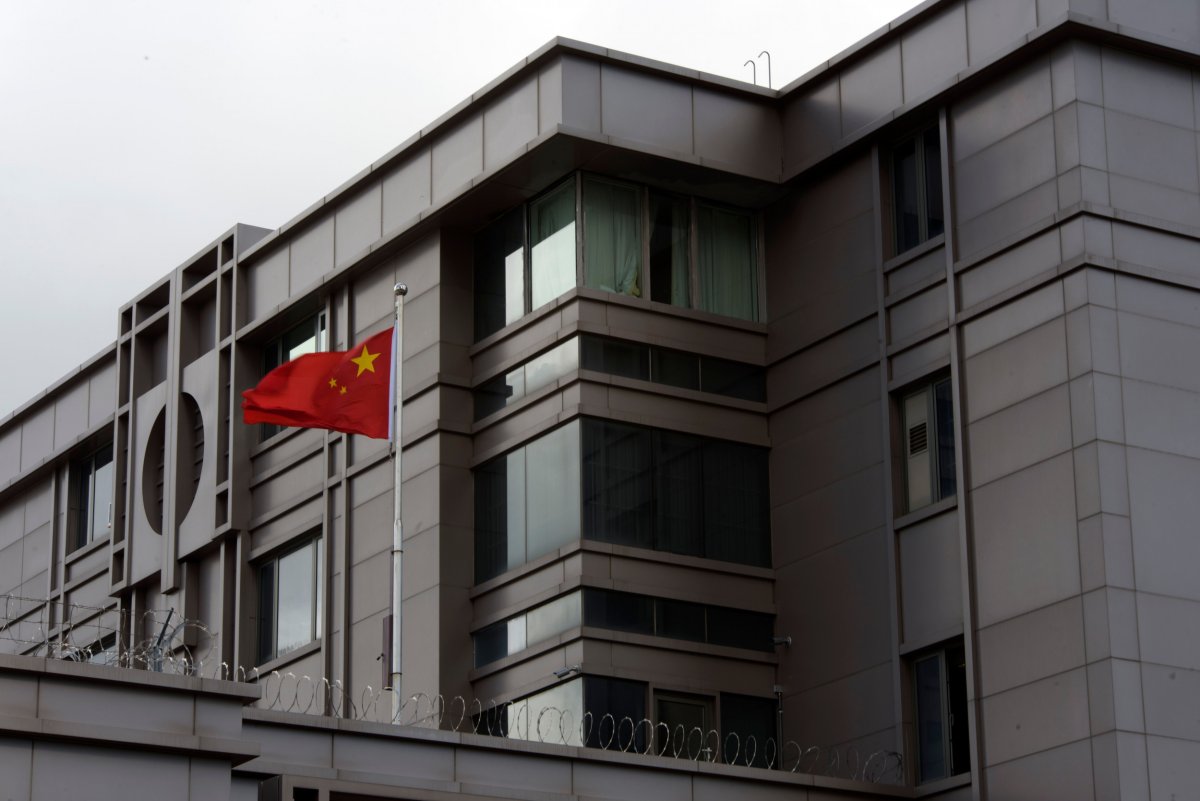The competition between the world's preeminent powers, the United States and China, is playing out on an unprecedented scale, involving what U.S. officials say is a grand theft that both the government and the private sector are struggling to combat.
Despite Chinese officials vehemently denying the mass systematic stealing of intellectual property, the most senior U.S. counterintelligence official said the ongoing heist sets the country back some half a trillion dollars a year as Washington and Beijing compete for technical and military supremacy in the 21st century.
"The theft of intellectual property by the People's Republic of China costs America as much as $500 billion a year," William Evanina, Director of the National Counterintelligence and Security Center, told Newsweek. "That's like taking $4,000 to $6,000 annually from every family of four in America."
This stark assessment comes as relations between Washington and Beijing continue to deteriorate ahead of the 2020 U.S. presidential election. The incumbent, President Donald Trump, set out to toughen the U.S. position toward China, which has become the target of daily accusations by senior U.S. officials on topics ranging from economics and trade to territorial disputes and human rights.
The real battles, however, play out daily in cyberspace.
The Federal Bureau of Investigation specifically blames Chinese leadership for an uptick in U.S. China-related counterintelligence cases, which Director Christopher Wray said in July accounted for nearly half of the 5,000 active counterintelligence cases.
"The Chinese Communist Party is the reason for the increase in counterintelligence cases with a nexus to China," the FBI said in a statement sent to Newsweek. "The CCP continues to prioritize theft of U.S. intellectual property and sensitive information for the benefit of its military and economy."
The targets, according to the FBI, largely include information technology and telecommunications networks as well as defense contractors, as Newsweek reported last month. The methods were said to be mostly cyber, but "China also relies on techniques such as intellectual property theft, legitimate purchases of U.S. corporations, and physical and property theft to acquire U.S. data," the FBI said.
However, as Newsweek reported earlier this year, not even the full extent of U.S. government resources are enough to combat the threat.

"The U.S. government is better able to identify counterintelligence threats because of outreach and collaboration with the private sector and other departments and agencies," the FBI said. "The FBI has been sounding the alarm about China for years, and we have been heavily engaged with the private sector and academia on the counterintelligence threat from China."
One of these private sector entities is CrowdStrike, a leading cybersecurity firm involved in high-profile investigations, including the 2014 Sony Pictures hack and attacks targeting the Democratic National Committee ahead of the 2016 elections.
Shawn Henry, president of CrowdStrike Services and former executive assistant director of the FBI, outlined a harrowing scenario to explain his company's role.
"We all would expect that, if foreign jet fighters came into U.S. airspace that, our Air Force would scramble jets, who would immediately get up in the sky and waive those jet fighters out of our airspace," Henry told Newsweek. "We would expect that if an invading army came in battleships up to our shorelines or they were marching across the border of the U.S., our military will respond to that."
But he said it's a different battle online.
"In the virtual space," Henry said, "the U.S. government doesn't have the capacity or the authority to do that."
Instead, he said, "It's the private sector, companies like CrowdStrike that are putting technology into companies that are detecting these attacks, and preventing malware from being executed and disrupting adversary attacks."
Still, intrusions happen every day. The Department of Justice announced Wednesday the unsealing of indictments against five Chinese nationals who had been charged with hacking into hundreds of companies from across the globe, in some cases stealing technology and in others installing ransomware that held systems hostage for money.
Robert Cattanach, a partner at the international law firm Dorsey & Whitney, who previously worked as a trial attorney for the United States Department of Justice and special counsel to the Secretary of the Navy, said the release "offers a telling peek into the ongoing cyber battle between the quasi-state hackers from China and the U.S. intelligence agencies tasked with preventing or at least minimizing the loss of American intellectual property."
"For companies concerned about whether they might be targets, the indictment graphically reinforces the importance of the defensive aspects of cybersecurity—keeping the bad guys out," Cattanach said. "And it also underscores how critical it is to have detection systems designed to alert companies when the bad guys get in, which inevitably they will if they want to badly enough."
He saw no end in sight for this costly cat-and-mouse game.
"This is a never-ending process," Cattanach said in remarks sent to Newsweek, "and today's ever-evolving budget and business priorities make it all the more challenging."
Such attacks have the potential to inflict devastating damage. Some experts and insiders have long attributed the dramatic decline and eventual death of Canada's once-leading telecommunications firm Nortel to a methodical campaign of hacking and personnel recruitment that they contend ultimately benefited leading Chinese company Huawei—an accusation the company has always denied.
In the U.S., the Justice Department has since accused China-based hackers of swiping designs, technology and business strategies in a bid to crush competitors in various industries. These include leading U.S. companies such as U.S. Steel, major aluminum producer Alcoa Inc. and nuclear supplier Westinghouse Electrical Company.
But what happens when such operations focus on national security-sensitive targets, including those involved in producing the very equipment designed to defend the country?

"The PRC pursues its military modernization ambitions through a national strategy it calls 'Military-Civil Fusion,'" a senior Trump administration official told Newsweek. "This strategy eliminates traditional divisions between the civilian and military industrial complexes to fast-track advancement of military technology to advance the PLA's warfighting capability."
The absence of a free and independent private sector in China makes this strategy possible.
"Private sector civilian Chinese entities are incentivized and co-opted to support Xi Jinping's 'Strong Military Dream,'" the official said, "and do not have the option of refusing when so directed by CCP authorities."
The plan would give Beijing an edge in closing the gap against the Pentagon's global military dominance, especially in the Asia-Pacific region.
"The PRC often advances its military development goals through industrial espionage, opaque partnerships, and manipulation of foreign academic exchanges," the official said.
The Fusion strategy is part of an interwoven strategic web designed to help achieve Chinese President Xi's objectives.
"Military-Civil Fusion also complements other PRC strategies, including the 'One Belt, One Road' initiative,'" the official told Newsweek.
The One Belt, One Road initiative, more commonly known as the Belt and Road Initiative, or BRI, is part of China's global master plan, with a targeted completion date of 2049. It takes its name from the Silk Road, the overland route by which China dominated world trade for nearly 20 centuries. It involves targeted investments in more than 70 countries and organizations worldwide, according the World Bank.
The Pentagon has taken this threat seriously enough to include it in the latest edition of its annual report entitled, "Military and Security Developments Involving the People's Republic of China (PRC)."
The report warns that China employs a variety of methods over a great range of targets to obtain information.
"The PRC pursues many vectors to acquire foreign technologies, including both licit and illicit means," the report said. "The PRC's efforts include a range of practices and methods to acquire sensitive and dual-use technologies and military-grade equipment to advance its military modernization goals."
China, it argued, "leverages foreign investments, commercial joint ventures, mergers and acquisitions, and state-sponsored industrial and technical espionage, and the manipulation of export controls for the illicit diversion of dual-use technologies to increase the level of technologies and expertise available to support military research, development, and acquisition."
Last year, these efforts included attempts to acquire random access memory, aviation, and anti-submarine warfare technologies, according to the report.
"Beijing has become the most adept nation in history at acquiring foreign civilian and military technology to boost its industry and national defense," Matt Brazil, a former U.S. Army officer and diplomat who serves as a non-resident Fellow at the Jamestown Foundation, told Newsweek.
Chinese officials have repeatedly rejected the notion that their country was the architect of a vast plot to steal information from abroad.
"The U.S. side has failed to back its allegation with even one single piece of solid evidence," the Chinese embassy in Washington told Newsweek.
"China is a big country in terms of innovation and intellectual property (IP), and has kept strengthening the protection of scientific innovation and intellectual property," the embassy added. "China is now among the world's leaders in terms of the scale and growth rate of innovation input."

The embassy pointed out how research and development expenditure in China has grown from about $44 billion in 2006 to nearly $300 billion in 2018. The country's massive population, the largest in the world, and its scientific focus also affords it the largest number of researchers, who have rapidly accelerated the number of patents filed both at home and internationally.
Beijing argues it also shored up protections domestically and joined international treaties to fight dishonest practices multilaterally.
"In recent years, China has continued to take effective measures, introduced a number of policies and measures to strengthen intellectual property, and intensified law enforcement and protection, which have produced remarkable results," the embassy added, citing changes to its trademark law and new national guidelines that further safeguard intellectual property.
The embassy cited positive assessments from several Western organizations. These included the World Bank, which has placed China in the top 10 improved economies of the annual Doing Business report the last two years in a row, as well as the U.S. Chamber of Commerce, which has praised Chinese measures to protect intellectual property, including in online sales and drug patents.
The former publication has since been paused by the World Bank, citing reported "irregularities" in data for the years 2018 and 2020, published in October 2017 and 2020 respectively.
As for the U.S. Chamber of Commerce, spokesperson Scott Hall told Newsweek that "China poses a dilemma for intellectual property-intensive innovators and creators," but he qualified his statement.
"On one hand the Chinese market is simply too big and fast-growing to ignore from a competition standpoint," he explained. "On the other hand, companies operating in the Chinese market must accept that foundational proprietary knowledge, whether in the form of patents, copyrights, trademarks, or trade secrets, risks being misappropriated."
His comments lend some credence to Beijing's argument that it has made strides in its intellectual property protection efforts.
"From a technical standpoint, China has substantively improved its intellectual property protection over a number of years," Hall said, "and this progress has been evidenced by its fairly steady rise in the rankings of the U.S. Chamber International IP Index."
With China's growing appreciation for the role in which intellectual property plays in stimulating innovation and creativity, Hall told Newsweek that his organization has "seen intellectual property governance and adjudication become more rigorous and predictable as the domestic demand for reliable IP rights has grown."
But systematic concerns linger.
"Nevertheless, and what is more difficult to quantify in an empirical analysis like the Chamber's Index," Hall said, "the political risk remains that in any given case the rules may not apply—and, if so, usually in a non-transparent fashion."
Uncommon Knowledge
Newsweek is committed to challenging conventional wisdom and finding connections in the search for common ground.
Newsweek is committed to challenging conventional wisdom and finding connections in the search for common ground.
About the writer
Newsweek editor at large; former FBI double agent and the author of "How to Catch a Russian Spy"
To read how Newsweek uses AI as a newsroom tool, Click here.








